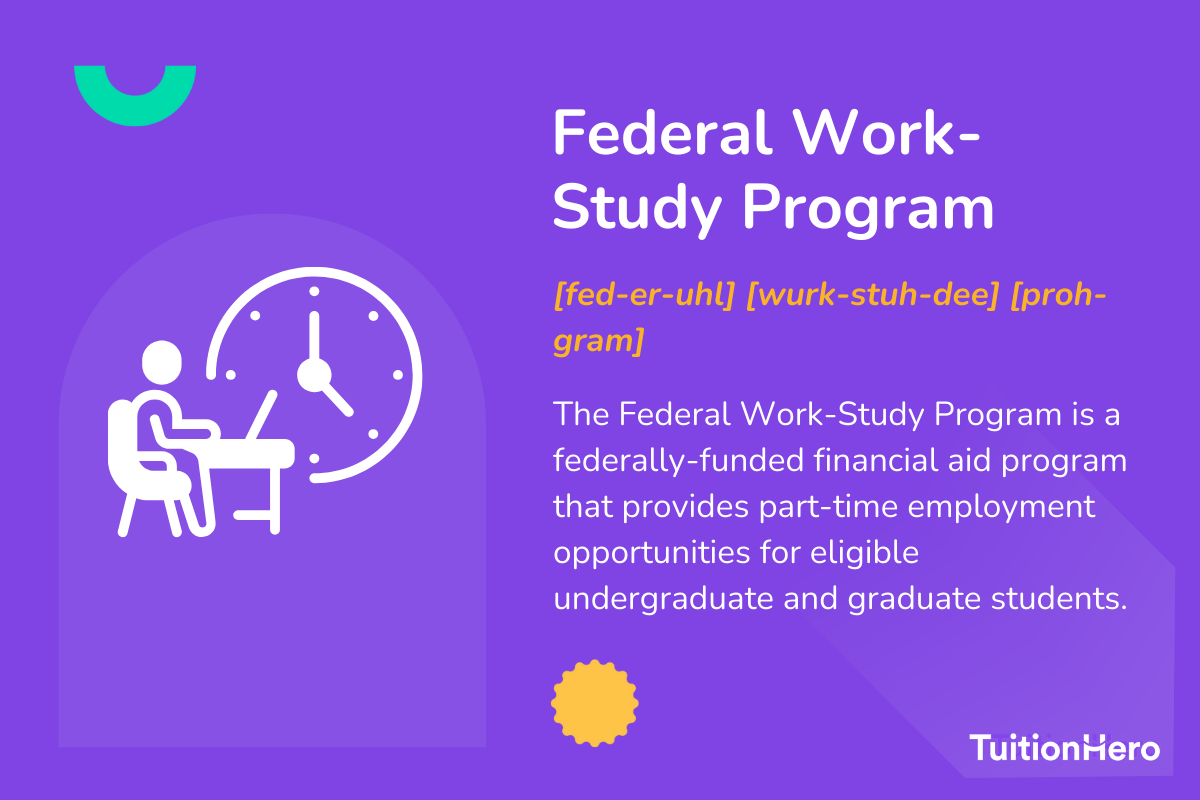Advertiser Disclosure
Last update: March 30, 2025
6 minutes read
What Is the Federal Work-Study Program?
Wondering how the Federal Work-Study program can help finance your college education? Explore the benefits, eligibility, and job options today.

By Derick Rodriguez, Associate Editor
Edited by Brian Flaherty, B.A. Economics
Learn more about our editorial standards



By Derick Rodriguez, Associate Editor
Edited by Brian Flaherty, B.A. Economics
Learn more about our editorial standards
Understanding financial aid can be confusing. Let's talk about the federal work-study program and how it's different from other types of financial aid. This is important for students and parents who want to figure out the best way to pay for education without ending up with a lot of debt. Plus, we’ll look at how navigating student loans plays a crucial role in your overall college financing plan.

Key takeaways
- Work-study is earned financial aid through part-time employment
- Eligibility depends on your FAFSA and college's specific criteria
- Earnings don't affect future financial aid eligibility
What is the federal work-study program?
The federal work-study program is a form of financial aid designed not just to support students financially but also to support their college experience. Unlike grants, scholarships, or loans, work-study funds are earned through part-time employment, providing a dual benefit of income and work experience.
This program requires students to secure work-study-eligible jobs, typically on-campus, and work a set number of hours to get payment. Eligibility for work-study depends on the information given in your Free Application for Federal Student Aid (FAFSA®).
Unlike immediate financial aid, the process to secure a work-study position involves applying for and being hired for eligible roles. This might seem challenging at first, but colleges usually help by hosting job fairs or posting job openings on campus job boards.

To find out if you’re eligible, it's important to start with your financial aid offer or directly ask your college's financial aid office. Work-study jobs cover a variety of different jobs, from helping at the campus library to working in research labs, offering valuable opportunities to gain experience relevant to your field of study.
Besides flexible scheduling tailored around class times, another big advantage is that earnings from a work-study job don’t affect your future financial aid eligibility. This characteristic sets work-study apart, making sure your hard-earned money supports your education without affecting future aid. For more details on balancing work with loans, here's how refinancing student loans might be an option worth exploring.
Now, let’s explore how students are paid, the variety of jobs available, and how to maximize the benefits of your work-study position. We’ll dive deeper into frequently asked questions, giving you a roadmap to navigate work-study properly.
Who is eligible for work-study?
How do I know if I've received work-study?
If your financial aid offer includes work-study, congratulations, you're eligible to apply for a work-study job at your college. This is a big first step in leveraging work-study effectively.
Your college should give you instructions on securing your position, typically through job fairs or campus job boards. Staying proactive and engaging with your college’s financial aid office can open doors to many work-study opportunities. Don't forget the importance of completing your FAFSA application as it’s necessary to determine your eligibility.
What if work-study isn't on my financial aid offer?
No work-study on your financial aid offer? Don't worry.
Reach out to the financial aid office at your college. Even if work-study wasn't initially awarded to you, there might still be an opportunity to qualify for or find an alternative on-campus job.

TuitionHero Tip
Remember, taking initiative can greatly affect your college finance strategy. For insights and options beyond work-study, understanding your expected family contribution can help you.
How do I get a work-study job?
Securing a work-study job means having a proactive approach. Start by exploring your college’s career website or contacting the financial aid office for potential listings.
When applying for college, mention the jobs you'd like to do while studying. Being eager and flexible increases your chances of getting a work-study job that matches your academic and career goals.
Remember, receiving work-study approval for financial aid doesn’t guarantee you a work-study job. Instead, it just gives you approval to start applying for them.
How much can I earn?
Your earnings from work-study are tied directly to the hours you work – there's no guaranteed amount. Since work-study jobs are required to be part-time, though, there’s an obvious limit to your earning potential at these roles. Generally, you can earn up to the total awarded in your financial aid offer.
However, some students might earn more depending on their job and the available funds at their college. To get a clear picture, have a conversation with your work-study job manager and the financial aid office. This not only clarifies expectations but also helps you plan your workload effectively.
Types of work-study jobs available
Work-study jobs are as diverse as the student body itself. From helping at the campus library to conducting research in academic departments, the possibilities are huge.
Most importantly, many of these positions are geared towards developing your skill set relevant to your field of study. Take the initiative to ask about these roles early, as competition can be fierce. Looking for job placements that align with your academic goals not only strengthens your resume but also enriches your college experience.
Compare private student loans now
TuitionHero simplifies your student loan decision, with multiple top loans side-by-side.
Compare Rates
Dos and don'ts of securing a work-study job
Getting a work-study job requires hard work, being on time, and knowing what's important to you. It's important to manage your schoolwork and job well. Here are some guidelines to help you work your way through this process efficiently.
Do
Apply early to increase your chances of securing a position that aligns with your skills and interests.
Be flexible about the type of work and the schedule, especially if it’s your first time applying for work-study.
Prepare a resume highlighting your skills, experiences, and academic achievements, even if it isn't required.
Communicate clearly with your potential employer about your availability and how you can contribute.
Don't
Wait until the last minute to apply for work-study positions, as many spots could be filled.
Ignore the job description specifics, like required skills or work hours, that might not align with your skills or timetable.
Underestimate the value of a well-prepared interview, even for seemingly casual or informal work-study positions.
Neglect the financial aid office’s guidance on how much you can work based on your work-study award.
Advantages and disadvantages of participating in a work-study program
Participating in a work-study program is a big commitment that comes with its unique set of benefits and potential drawbacks. Understanding these can help you make an informed decision about whether work-study is the right choice for you.
- Financial support: Earnings help with college expenses, reducing the need for student loans.
- Work experience: Provides valuable on-the-job experience that can enhance your resume.
- Flexible scheduling: Jobs typically accommodate your class schedule.
- Networking opportunities: Connects you with faculty, staff, and other students, expanding your professional network.
- Non-impact on financial aid: Earnings don't affect your financial aid eligibility for the following year.
- Limited earnings potential: There's a cap on how much you can earn, which might not cover all your financial needs.
- Time commitment: Balancing work hours with study time and coursework can be challenging.
- Job availability: Not all jobs may align perfectly with your career interests.
- Competition: High demand for certain positions can make securing a desirable job difficult.

Why trust TuitionHero
At TuitionHero, we know that figuring out how to pay for college can be tough. That's why we're here to help you understand everything, including the federal work-study program. We provide resources and tools to connect you with private student loans, loan refinancing, and scholarships that go well with your work-study income. We also help with FAFSA to make sure you get all the financial aid you can. Think of us as your partner in creating a simpler and well-informed plan for paying for college.
Frequently asked questions (FAQ)
Yes, part-time students can participate in the federal work-study program, as long as they meet the eligibility requirements set by their institution and the federal government. However, the number of hours you're allowed to work and the total amount you can earn may be adjusted to reflect your part-time status. We recommend consulting with your college's financial aid office for specific guidelines and opportunities.
While work-study earnings are typically paid directly to students to help cover living expenses and educational costs, you can decide to apply this income towards your tuition. It's important to budget accordingly, as you'll get these earnings through a paycheck, allowing you the flexibility to allocate funds as you see fit. Planning and communication with your financial office can help you make the most of your work-study earnings in a way that aligns with your financial strategy.
Yes, there are off-campus work-study opportunities available, particularly through nonprofit organizations and public agencies that have agreements with colleges. These positions usually provide services that are in the public interest or are related to your field of study, offering another way to gain valuable experience while earning your work-study award. To explore these options, check with your college's financial aid or work-study office for available listings and partnership details.
Final thoughts
It’s clear that this financial aid option presents a valuable opportunity for students to earn money, gain work experience, and contribute to their education financing. Whether you're eligible and decide to pursue work-study or explore other financial aid avenues, remember that planning and being proactive are your best strategies. And remember, TuitionHero is here to support you every step of the way, offering resources for private student loans, refinancing options, scholarships, and more.
Source
Author

Derick Rodriguez
Derick Rodriguez is a seasoned editor and digital marketing strategist specializing in demystifying college finance. With over half a decade of experience in the digital realm, Derick has honed a unique skill set that bridges the gap between complex financial concepts and accessible, user-friendly communication. His approach is deeply rooted in leveraging personal experiences and insights to illuminate the nuances of college finance, making it more approachable for students and families.
Editor

Brian Flaherty
Brian is a graduate of the University of Virginia where he earned a B.A. in Economics. After graduation, Brian spent four years working at a wealth management firm advising high-net-worth investors and institutions. During his time there, he passed the rigorous Series 65 exam and rose to a high-level strategy position.
At TuitionHero, we're not just passionate about our work - we take immense pride in it. Our dedicated team of writers diligently follows strict editorial standards, ensuring that every piece of content we publish is accurate, current, and highly valuable. We don't just strive for quality; we aim for excellence.
Related posts
While you're at it, here are some other college finance-related blog posts you might be interested in.
Shop and compare student financing options - 100% free!

Always free, always fast
TuitionHero is 100% free to use. Here, you can instantly view and compare multiple top lenders side-by-side.

Won’t affect credit score
Don’t worry – checking your rates with TuitionHero never impacts your credit score!

Safe and secure
We take your information's security seriously. We apply industry best practices to ensure your data is safe.
Finished scrolling? Start saving & find your private student loan rate today
Compare Personalized Rates




